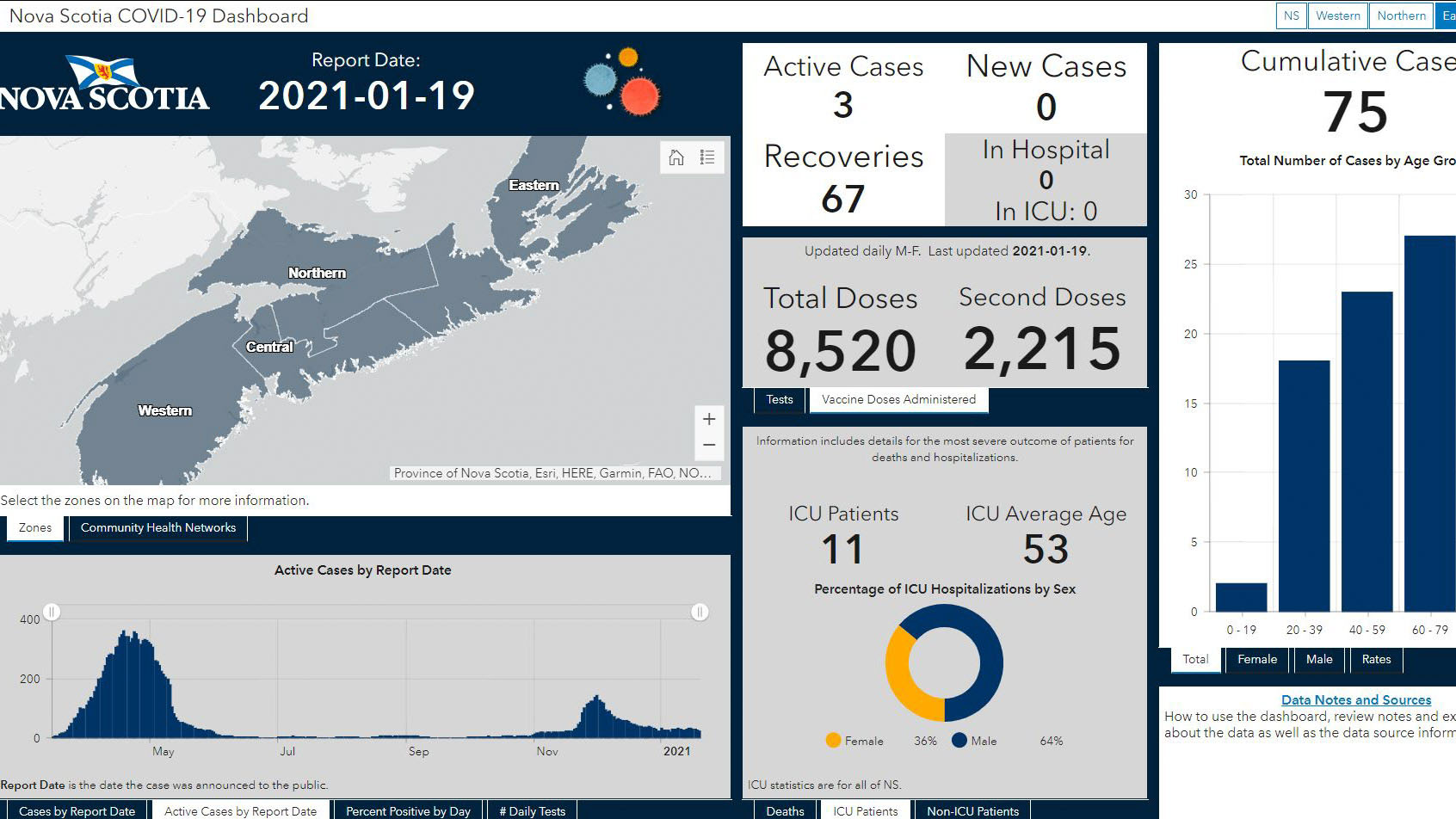First Nations, African Nova Scotian communities part of 60-90 day vaccination rollout plan
Vaccines are still entering communities despite Pfizer pause

caption
A screenshot of the new COVID-19 dashboard.The province says there will be COVID-19 vaccination clinics set up for First Nations and African Nova Scotian communities sometime before May.
These will be “prototype single clinics,” Dr. Robert Strang, chief medical officer of health, said at the COVID-19 briefing on Tuesday.
“We will be working very closely with our First Nations and African Nova Scotian communities to ensure that we are offering the vaccine in a culturally responsive way and they have a large role in informing how those clinics work, the communication in their communities, and who is identified in their communities as their first priority for immunization.”
Strang didn’t say where these clinics would go. A spokesperson for the Department of Health and Wellness told The Signal “more details about these clinics will be shared as they are finalized.”
As of Wednesday, there have been 13,873 confirmed positive cases of COVID-19 in Indigenous communities in Canada, with 5,571 still active. Eight of these are in the Atlantic provinces.
In the past, these communities have been disproportionately affected by virus outbreaks. In the case of H1N1 in 2009, Indigenous people were overrepresented in terms of deaths, hospitalizations and admissions to intensive care.
Nova Scotia’s 30-day vaccine plan includes getting cold storage units to Amherst, Antigonish and Bridgewater, setting up three more health-care workers clinics and opening more clinics in long-term care facilities, rehabilitation centres and adult residential centres.
This province’s vaccination plan for the next 60 to 90 days includes prototype health-care provider clinics, where people 80 or older can go to receive a vaccine. Strang said these clinics will be in Halifax and Truro, and people will be contacted by mail based on the address registered to their MSI card. There will also be an online option.
In addition, there will be:
- Open health-care worker clinics in Amherst and Bridgewater,
- Plans for mass immunization in locations with cold storage sites,
- Health-care worker clinics to include primary care physicians, pharmacists, and home-care workers.
Pfizer delay
With the pausing of the Pfizer-BioNTech COVID-19 vaccine distribution, provinces have been extending the time frame between the first and second doses.
Strang said this means, “any reduction we’re getting for February will be added to our supply that we can expect in March.”
As of Wednesday, the province has administered 9,175 doses of the COVID-19 vaccine. A little more than 2,500 of those people are now fully immunized and 5,850 more doses are expected to arrive this week.
Strang said with Tuesday’s opening of the vaccine clinic in the Colchester East Hants Health Centre in Truro, there is now a “health-care worker-based clinic operating in every health zone in the province.”
New access to COVID-19 stats
There were 23 active cases as of Wednesday. When Strang announced four new cases on Tuesday, he praised Nova Scotians but asked them to be wary.
“Our epidemiology continues to look promising with zero cases yesterday,” said Strang. “But today we are reporting four new cases, so we must continue our cautious, careful, and vigilant approach.”
A new COVID-19 dashboard was launched Tuesday to provide data including the number of cases and vaccines distributed, all divided up into zones. It will be updated daily from Monday to Friday.
Strang said not all Nova Scotians want this dashboard, but for those who do it’s a place to gain “more information and a better understanding of the data that we have.”
Symptoms and testing
Anyone experiencing one of the following symptoms should complete an online self-assessment or call 811 to determine if they should be tested:
- Fever
- New or worsening cough
Anyone with two or more of these symptoms should also consider testing:
- Shortness of breath
- Runny nose/ nasal congestion
- Sore throat
- Headache
About the author
Alexandrea Guye
Alexandrea Guye is a journalist with The Signal located in Kjipuktuk/Halifax. She loves the outdoors and is interested in local stories, human...
